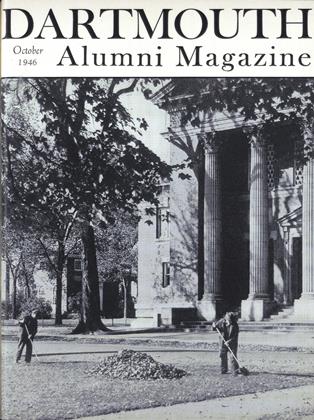There is something about the start of a new college year that lifts the spirits and jiggles the mental patterns, even among those who know the experience year after year. It is something that perhaps only an impressionist painter might capture, for it is an indefinite compound of the familiar and the strange, continuity and sharp break, of clean slates, fall briskness and renewed youthfulness, of sureness and uncertainty, maturity and greenness, of spotless notebooks, footballs and freshman caps, of reunion and new acquaintance—all overlaid with a warm sense of fellowship and common purpose such as is given to few human enterprises in time of peace.
There is, admittedly, a large element of emotion in this picture, but for Dartmouth men that element has always been part of the college| experience, and a healthy one that gives balance and some of the motivating force to the main business of the College, which is learning. This fall the emotional anticipation of the new college year is heightened by the fact that Dartmouth has not enjoyed such a sense of beginning since before the war. The accelerated year-round schedule somehow failed to give any feeling of a fresh start, and for the Hanover traditionalist November is no time to start the fall term, anyway. November in these parts is practically winter.
The official opening of the 178th year on the morning of October 4 will be a special beginning in another sense. It will mark, as much as any one date can mark something gradual, the arrival of the Postwar College about which much has been written in these columns and elsewhere. For one thing, Dartmouth returns this fall to its normal, two-semester academic year, and for another, it will have an all-civilian student body for the first time since the wartime alliance of the College with the Navy. A peacetime NROTC unit continues as an important part of the College, but its members will be civilian undergraduates first and naval trainees only secondarily. Other factors in the definite arrival of postwar Dartmouth—or perhaps we should say the return of prewar Dartmouth—are the restoration of the faculty to full strength and the revival of traditional campus activities and organizations. The Dartmouth will again become a daily paper; DBS will reopen its campus network; Freshman Commons, fraternity rushing, and "heeling" will reappear on the old basis; student government, headed by Palaeopitus, will be fully reestablished; and even the Big Green football schedule will return to its old Ivy League self. These are but a few of the things that have been missed and will be welcomed back to the campus.
New things will be part of the 178th year too, notably the revised curriculum which will later include the required senior-year course in Great Issues. With new officers in two key administrative posts, John Sloan Dickey launches his first regular year as President of the College. Behind him are eleven arduous months of learning the details of his job and meeting thousands of Dartmouth men. He has come through them with flying colors, further strengthening the conviction that under his leadership Dartmouth is destined for an era of great accomplishment and public service. Seldom, if ever, has the College opened a new academic year with faculty morale so high, thanks to the recent Trustee action on salaries which President Dickey sponsored ans thanks even more to his enunciation of the long-range policy of taking further steps which will assure "Dartmouth of being able to maintain and gather a distinguished teaching faculty second to that of no other liberal arts college." This thinking is reassuring to all that first things will continue to be put first.
Nothing has been said here about the problems and headaches of the new year, but they too will be a part of Dartmouth's 178th year, doubtless a memorable part. An enrollment of 2,900 men, largest in the history of the College, will bring with it unprecedented problems with regard to housing, feeding, instruction, and local services. These problems, plus the unusual character of the student body and of the continuing admissions bulge, might well blot out all other thoughts concerning the new fall term; but, important and omnipresent as they are, they probably will not obscure for the great majority of Dartmouth men the happy fact that the College has come almost full circle to being again the Dartmouth they remember so well and missed so greatly during the past five years.
AN INFRA-RED PHOTOGRAPH OF BAKER LIBRARY GIVES A STRIKING VIEW FROM TUCK MALL
 View Full Issue
View Full Issue
More From This Issue
-
 Sports
SportsWith Big Green Teams
October 1946 By Francis E. Merrill '26 -
 Class Notes
Class Notes1917
October 1946 By MOTT D. BROWN, DONALD BROOKS, SUMNER B. EMERSON -
 Article
ArticleOPERATION CROSSROADS
October 1946 By WILLIAM J. MITCHEL JR. '42 -
 Article
ArticleThe Coming "Boom and Bust"
October 1946 By BRUCE W. KNIGHT -
 Article
ArticleCan We Achieve Economic Stability?
October 1946 By JAMES F. CUSICK, -
 Class Notes
Class Notes1918
October 1946 By ERNEST 11. EARLEY, DONALD L. BARR













